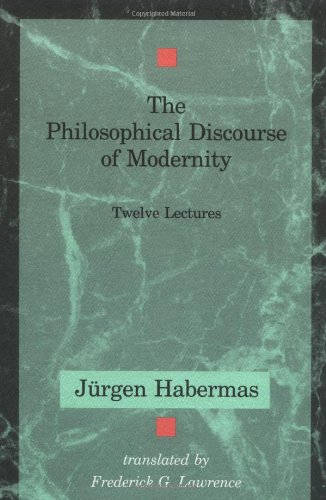The Philosophical Discourse of Modernity epub
Par dailey mark le dimanche, septembre 25 2016, 01:21 - Lien permanent
The Philosophical Discourse of Modernity. Frederick Lawrence, Jurgen Habermas, Thomas McCarthy

The.Philosophical.Discourse.of.Modernity.pdf
ISBN: 0745608303,9780745608303 | 456 pages | 12 Mb

The Philosophical Discourse of Modernity Frederick Lawrence, Jurgen Habermas, Thomas McCarthy
Publisher: Polity Press
Discourse on Method (1637); Meditations on First Philosophy (1641); Replies to Objections to the Meditations (1641–2); Principles of Philosophy (1644); Passions of the Soul (1649) Blaise Pascal 1623–62 .. Jürgen Habermas, The Philosophical Discourse of Modernity: Twelve Lectures, trans. Jürgen Habermas also employs excursuses (the English plural; not “excursi,” if we followed the Latin) in his masterful overview, The Philosophical Discourse of Modernity (1987). The Philosophical Discourse of Modernity: Twelve Lectures. Thus, on this line of reasoning, in the early twentieth century German philosopher Martin Heidegger theorized modernity as a huge system of “enframing” that reduced things to mere objects and functions available for human use. Sign up for LibraryThing to find out whether you'll like this book. Moral Consciousness and Communicative Action, 1990. De Cive (1642); Leviathan (1651); De Corpore (1656); De Homine (1658) René Descartes 1596–1650. "William Blake Rejects the Enlightenment." Critical Essays on William Blake. Lawrence, Cambridge, MA: MIT Press 1987, 293. The Philosophical Discourse of Modernity, 1987. No one else in the meeting had heard of Habermas. The Philosophical Discourse of Modernity (1985) Alasdair MacIntyre 1929– A Short History of Ethics (1966); After Virtue (1981); Whose Justice? Foucault, "Society Must be Defended", 29-30. Cambridge: The MIT Press, 1996. Which has been predominant in the philosophical discourse on virtue.